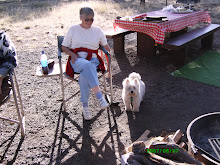


It occured to me that I had told about my father but said very little about Mam. Annie Davies was born 1899, the middle daughter of John and Mary. The above photos show her first at 14 years old, then somewhere in the 40's with my Dad, and the last one was on her 80th birthday. She lived to be 83. A tomboy as a child, she always shows up in childhood photos with her hair mussed up and a slightly defiant look on her face. I have a feeling she was a handful! She used to tell about her childhood years when she had to go to her grandparent's dairy early each morning and carry heavy pails of milk door to door delivering same. All this done before she went to school. She left school at 14 and worked as a maid and nanny for her great-aunt. She was allowed Wednesday evenings off for three hours and got her room and board and a very small allowance. My father made her leave that position when he started dating her and she worked for a doctor and his wife thereafter until she married. She was a very hard worker - running a 17 room hotel (all meals provided) until I was born, then they moved to a smaller home (6 bedrooms) and every summer would rent the extra rooms out on what was known as 'apartments'. This meant that each family would provide my mother with the food they wanted cooked each meal, each day. She had a four burner gas stove, yet somehow was able to serve up to three families at a time, plus us with a complete meal - consisting most times of four different meats, different vegetables and different deserts. She had stacking saucepans to accomplish this.
My mother was not demonstrative, and did not express her love in hugs, kisses and compliments. And she didn't share much of herself - no fun times together cooking, and I left home not knowing how to boil an egg! But looking back, I realized how my mother was ALWAYS THERE. She fed us well, kept a good home, taught us the good values and behavior and would always be waiting when I came home from school, with a cup of tea and something she had baked, and in the winter, warm hands to rub my cold feet and hands in front of the fire. A tiny woman, about 4 foot 10 inches in height and only reached 100 lbs. once in her life, when she was pregnant with my older brother. I left home when I was only 16 and four years later moved to Canada, and subsequently to this country. I had my mother visit me for three months at a time when she was 77, 79 and 81 (after my father had died) and I sometimes reflect on how I didn't really know her as a person. I wish now that I had stopped to realize then just how strong my mother was - not physically, but emotionally. I know a lot of my 'stick-to-it-ness' comes from her and some of my strengths. Unfortunately the alcoholicism came from her too, and may be that's what got in the way of our really knowing and understanding each other. But she was a good mother and I'm glad that I believe that she hears me now when I tell her that she is admired and loved by me.



